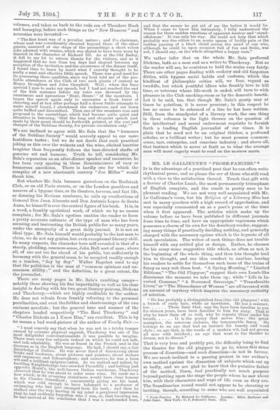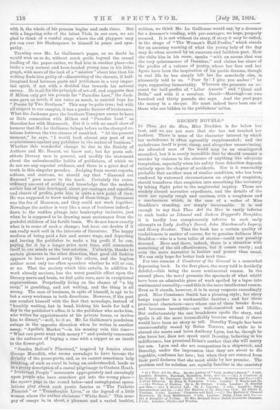MR. LE GALLIENNE'S " PROSE-FANCIES."* IT is the advantage of
a practised poet that he can often write rhythmical prose, and so please the ear of those who still read with a view to the satisfaction thereof. Touch that gift with a flavour of Charles Lamb, the most permanently triumphant of English essayists, and the result is pretty sure to be pleasant reading. We are not very well acquainted with Mr. Le Gallienne's verse, but his Religion of a Literary Man has met in many quarters with a high record of approbation, and was especially commented on as a poet's prose at the time when it first appeared. The articles which make up the volume before us have been published in different journals from time to time, and have an appropriate vagueness which possesses a charm of its own for the desultory reader, suggest- ing many things if practically deciding nothing, and generally charged with the necessary egoism which is the keynote of all such speculation. The writer of such things does not trouble himself with any settled plot or design. Rather, he chooses for his essay some suggestive title which, as often as not, is the beginning of the whole thing, and then lets thought lead him to thought, and one idea conduct to another, leaving his readers to settle for themselves such issue of the trains of fancy as may suit them best. "A Spring Morning," "Limited Editions," "The Old Playgoer," suggest their own Lamb-like discourses the moment we take them up ; while " Life in In- verted Commas," "A Borrowed Sovereign," " Transferable Lives," or " The Blessedness of Woman " are all invested with an amount of mystery which inspires the necessary curiosity of solution.
"He has probably a distinguished face [the old playgoer] with a bunch of curly hair, white as hawthorn. He has a manner, too Those lines that, may be, have been familiar to you for sixteen years, have been familiar to him for sixty. That is why he knew them off so well, why he repeats them under his
breath It is the poetry that moves him ; the great metaphor, the sonorous cadence, the honeysuckle fancy. He belongs to an ago that had an instinct for beauty and word style ; an age that, in the words of a modern wit, had not grown all nose with intellect ; an age that went to the theatre to dream, not to dissect."
That is very true and prettily put, the difficulty being to find the theatre for the old playgoer to go to, where this same process of dissection—and such dissection—is not in favour. We are much inclined to a passing protest in our author's own method against the dissection of subjects which cut up so badly, and we are glad to know that the putative father of the method, Ibsen, had practically not much purpose beyond putting upon the stage the people whom he saw about him, with their characters and ways of life even as they are. The Scandinavian round would not appear to be elevating or inviting, though, according to some who are well acquainted * Prose-Fancies. By Richard Le Gallionne. John Lane. New York : G. P. Patnam's Bons.
London : Nlkiu Mathews and 1894,
with it, the whole of his process begins and ends there. But with a lingering echo of the latest "Viola in our ears, we are glad to think of a restful stage where the old playgoer may yet run over his Shakespeare to himself in peace and sym- pathy.
Turning over Mr. Le Gallienne's pages, as no doubt he would wish us to do, without much guide beyond the casual leading of the paper-cutter, we find him in another place—he looks a very earnest and keen-headed young man in his litho- graph, with more of the look of a " mission " about him than his writing finds him guilty of—discoursing of the chronic, if half- imagined feud between poets and publishers in a very impar- tial spirit, if not with a decided bias towards his natural enemy. He is all for the principle of set-off, and suggests that if Milton only got ten pounds for "Paradise Lost," the Jack- sons gave as much, if not twice as much, to untried boys for " Poems by Two Brothers." This may be quite true; but with all respect to our essayist, it has a poetic flavour of irrelevance. What the jacksons gave the brothers Tennyson seems to have as little connection with Milton and "Paradise Lost" as Macedon has with Monmouth. But it is with no small show of humour that Mr. Le Gallienne brings before us the changed re- lations between the two classes of mankind. "At the present moment," he says, " I would back almost any poet of my acquaintance against any publisher in the matter of business?' Whether this wonderful change be due to the Society of Authors and Mr. Besant, we know not; but for poets sub- stitute literary men in general, and modify the statement about the unbusinesslike habits of publishers, of which we do not see any especial evidence, and there is a great deal of truth in this singular paradox. Judging from recent reports, actions, and orations, we should say that " diamond out diamond " goes nearer to the mark. Certainly the extra- ordinary amount of avidity and knowledge that the modern author has of late developed, about percentages and royalties and shares of profits, puts him in quite a new point of view. He was supposed to know nothing of these things. Parnassus was the foe of Mammon, and they could not work together. Nowadays the author is very like a man of business indeed,— down to the sudden plunge into bankruptcy inclusive, just when he is supposed to be drawing most sustenance from the grateful children of his fertile brain. We do not know exactly what is to come of such a change; but have our doubts if it can really work well in the interests of literature. The happy medium of being paid a fair and secure wage, and departing and leaving the publisher to make a big profit if he can, paying for it by a longer price next time, still commends itself to our minds as the best solution. Unluckily, thanks to certain pioneers in the other direction, that good old fashion appears to have passed away like others, and the hapless author must only too often speculate whether he will or can, or no. That the anxiety which this entails, in addition to work already anxious, has the worst possible effect upon the literary nerve and brain, we feel quite sure, save in exceptional organisations. Perpetually living on the chance of "a big coup," is gambling, and not writing, and the thing is all wrong. The man of business, in spite of himself, is apt to be but a sorry workman in both directions. However, if the poet can comfort himself with the fact that nowadays, instead of "humbly waiting, hat in hand, kicking his heels for half a day in the publisher's office, it is the publisher who seeks him, who writes for appointments at his private house, or invites him to dinner,"—well, be it so. Mr. Le Gallienne's pendulum swings in the opposite direction when he writes in another essay, "Apollo's Market "—in his musing vein this time- " What can poets want with money F" and quaintly comments on the unfitness of buying a rose with a copper as an insult to the flower-girl.
" Sandra Belloni's Pinewood," inspired by fancies about George Meredith, who seems nowadays to have become the divinity of the prose-poets, and, as we cannot sometimes help thinking, of such as excel in being un-understanded, lands us in. a pretty description of a casual pilgrimage to Oxshott Heath. " Irrelevant People " comments appropriately and amusingly upon people who have somehow got into the wrong place— the square pegs in the round boles—and metaphysical specu- lations play about such poetic fancies as " The Pathetic Flourish" or " Transferable Lives," or the legend of a little woman whom the author christens " White Soul," This nose- gay of essays is, in short, a pleasant and a varied booklet, written, we think Mr. Le Gallienne would say, by a dreamer for a dreamer's reading, with per-centages, we hope, properly secured. It is not without its story, if story it may be called, in the shape of " The Woman's Half-Profits," which stands. for an amusing warning of what the young lady of the day may do when scorned by an amorous and faithless poet. How she visits him in his room, speaks " with an accent that was the very quintessence of Ibsenism," and claims her share of the profits of a volume of poetry, where her face and her figure have been the inspiration of his poetic dreams, though in real life he has simply left her for somebody else, is pleasantly told to us. " Poor fly ! I give you amber !" he says, suggesting immortality. Whereon she presents an ac- count for half-profits of " Liber Amoris " and " Coral and Bells," and with it a revolver. Death—Marriage—or two hundred and thirty pounds, she says. And the poet pays the money in a cheque. He must indeed have been one of those who are bidden to the publishers' tables.



































 Previous page
Previous page